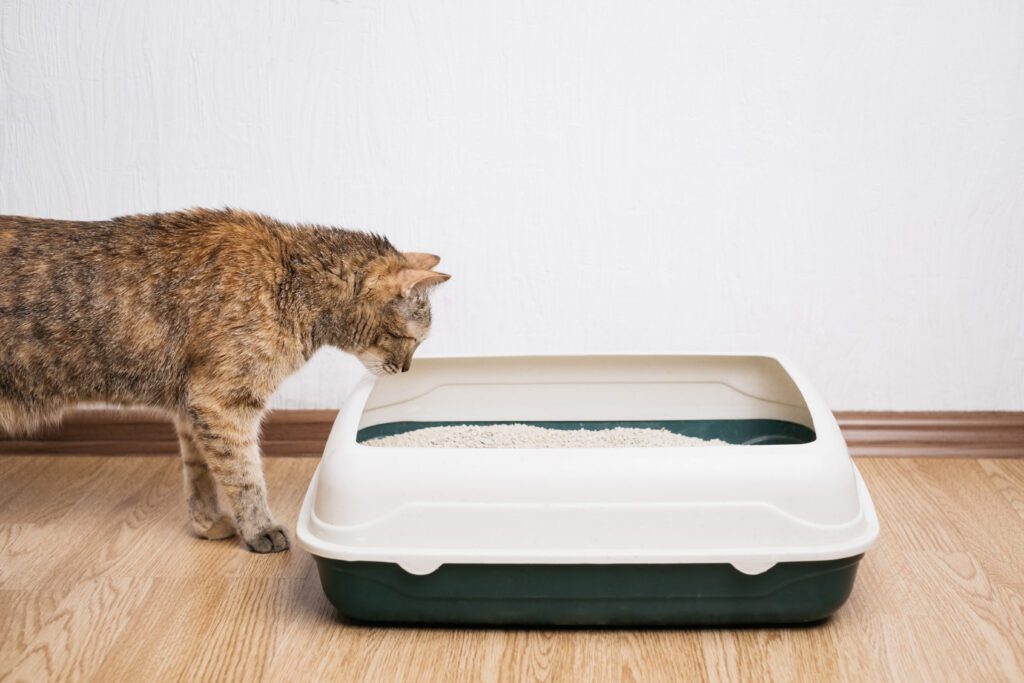Navigating the challenge of a cat peeing outside the litter box can be perplexing and frustrating for pet owners. This blog is dedicated to unraveling the mystery behind this common issue, providing insights into the various causes, and presenting practical solutions. At Caring Hearts Animal Hospital in Matthews, North Carolina, we understand how distressing this problem can be, and we’re here to help. If you live in Matthews, Stallings, Indian Trail, or Mint Hill, we’re close at hand and ready to assist you. Call us today at 704-893-2799 for advice and support!

Why Do Cats Pee Outside the Litter Box?
Cats are known for their cleanliness, so when they start peeing outside their litter box, it’s a sign that something is amiss. This behavior is not just a nuisance; it can be indicative of underlying issues that need attention. Understanding the root causes is the first step in addressing the problem. From social stressors to health concerns, several factors could be influencing your cat’s behavior. Early intervention is key to preventing more serious complications and maintaining a harmonious household. Remember, prompt veterinary care can provide both relief for your cat and peace of mind for you.
Social and Behavioral Causes of Improper Litter Box Use
Behavioral and social factors play a significant role in why cats may choose to avoid their litter box. Stress, anxiety, and changes in the home environment can disrupt a cat’s routine and lead to this unwanted behavior.
Factors such as the introduction of new pets, changes in the family dynamic, or even a new litter box can trigger stress in cats. Additionally, territorial disputes, especially in multi-cat households, can result in cats marking their territory outside the litter box. Understanding these triggers is crucial in developing a strategy to modify your cat’s behavior and create a more comfortable environment for them.
Environmental Adjustments
Altering the home environment can significantly impact your cat’s litter box habits. Providing multiple litter boxes in different locations, especially in multi-cat households, can reduce stress and territorial behavior. Ensuring the litter boxes are clean, accessible, and placed in quiet, private areas can also encourage proper use.
Sometimes, switching to a different type of litter or a more open litter box design can make a world of difference. These adjustments, though simple, can greatly enhance your cat’s comfort and willingness to use their litter box appropriately.
Health-Related Causes Behind Improper Litter Box Use
Health issues are a common and important consideration when a cat is peeing outside the litter box. Urinary tract infections, kidney problems, diabetes, and arthritis are just a few of the medical conditions that could be causing this behavior. These conditions can cause discomfort or pain during urination, leading cats to associate the litter box with these negative experiences. It’s essential to seek veterinary care to diagnose and treat any underlying health problems. At Caring Hearts Animal Hospital, our team is equipped to identify and address these health concerns, ensuring your cat’s well-being and comfort.
Recognizing Additional Symptoms
It’s important to watch for other symptoms that may accompany your cat’s litter box issues. Signs like increased frequency of urination, blood in the urine, vocalizing while urinating, or excessive grooming of the genital area are red flags. If you notice any of these symptoms, it’s time to consult with a veterinarian immediately. These could be signs of serious health issues requiring prompt medical attention. Early detection and treatment are vital for your cat’s health and can prevent more severe complications.
How Caring Hearts Animal Hospital Can Help
At Caring Hearts Animal Hospital, we offer comprehensive solutions to address the issue of cats peeing outside the litter box. Our approach includes thorough medical examinations to rule out or treat any health-related causes. We can also provide behavioral consultations to help you understand and modify your cat’s behavior. Our team is skilled in advising on environmental modifications and can recommend strategies tailored to your cat’s specific needs. From medical treatment to behavioral therapy, we’re committed to helping you and your cat find a lasting solution.
Contact Us If You Need Assistance
If you’re struggling with your cat’s litter box habits, don’t hesitate to contact Caring Hearts Animal Hospital at 704-893-2799. Our knowledgeable team is here to provide support and guidance, whether it’s scheduling a medical examination or discussing behavioral strategies. We understand the unique challenges that come with pet ownership and are dedicated to helping you and your cat live a happy, stress-free life together.
